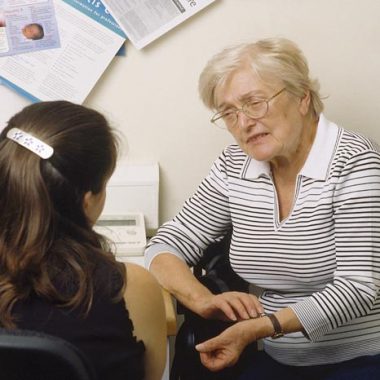GP practices should be encouraged to do more to screen elderly patients opportunisticaly for atrial fibrillation, according to the expert heading up European guidance on the condition.
Professor John Camm, professor of clinical cardiology at St George’s University and chair of the European Society of Cardiology (ESC) atrial fibrillation guidelines committee, said more needed to be done to pick up patients who are asymptomatic and that he was disappointed NICE had not endorsed the European guidelines approach of doing opportunistic pulse checks in all patients over 65, regardless of any symptoms.
Professor Camm made the comments to Pulse after presenting the findings of a global survey of cardiologists at the European Society of Cardiology annual congress in Barcelona.
The survey revealed 99% of cardiologists in the UK believe patients are experiencing delays getting a diagnosis of atrial fibrillation, largely because the patient was asymptomatic. Professor Camm said an estimated 30-40% of people with atrial fibrillation are asymptomatic.
He told Pulse: ‘I was personally disappointed that NICE did not recommend opportunistic testing in the elderly as we did in the European guidelines – but they did include the notion of opportunistic pulse taking, albeit when triggered by a symptom.’
He added: ‘The delay in diagnosis remains an issue in the UK, and we don’t have any [systematic] checks for the majority of people.’
Asked if he believes pulse checks should be part of the NHS Health Checks programme, Professor Camm said: ‘Yes I do, but it’s been very difficult to get that implemented.
‘The main reason it has not been is that there has been some concern about whether or not doctors knew what to do about it once detected, with lots of debates about rate or rhythm control, and so on.
‘But we’re arguing the fine points really, because we do know, based on very solid evidence, that we need to combat the stroke risk – and we can do that.’
Although there is no national programme for atrial fibrillation screening, some practices have local agreements to do opportunistic pulse checks for atrial fibrillation, or routine screening in elderly people attending flu immunisation clinics as part of the NHS QIPP (Quality Innovation, Productivity and Prevention) programme.
Some areas have also adopted the WatchBP device endorsed by NICE last year to help improve detection of atrial fibrillation in primary care.
Dr Terry McCormack, secretary of the British Hypertension Society and a GPSI in cardiology in Whitby, North Yorkshire, told Pulse his practice picks up about seven new cases of atrial fibrillation each year by the flu clinic route.
Dr Matthew Fay, a GPSI in cardiology based in Shipley, who developed the NICE guidelines on atrial fibrillation, said it was not part of NICE’s remit to advise on routine screening.
Dr Faye said: ‘We should be aware that the [NICE] guideline was never going to look at “screening” for atrial fibrillation and this is the function of the National Screening Committee.’
Dr Fay noted the Committee’s criteria for implementing a national screening programme have not yet been met, particularly in terms of evidence over which group should be targeted and the economic and societal impact, while the costs of screening to the NHS would be high, until more direct ECG acquisition and diagnosis techniques are available.
He said: ‘So do I feel we should screen for atrial fibrillation? Yes, agree 100%. Can I prove it is a good idea and financially stable for the NHS to do this? No – we need to do more research and we knew this when we were asked not to look at it in the guideline.’

Visit Pulse Reference for details on 140 symptoms, including easily searchable symptoms and categories, offering you a free platform to check symptoms and receive potential diagnoses during consultations.











